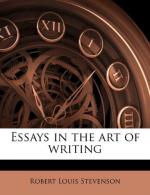Now the first merit which attracts in the pages of a good writer, or the talk of a brilliant conversationalist, is the apt choice and contrast of the words employed. It is, indeed, a strange art to take these blocks, rudely conceived for the purpose of the market or the bar, and by tact of application touch them to the finest meanings and distinctions, restore to them their primal energy, wittily shift them to another issue, or make of them a drum to rouse the passions. But though this form of merit is without doubt the most sensible and seizing, it is far from being equally present in all writers. The effect of words in Shakespeare, their singular justice, significance, and poetic charm, is different, indeed, from the effect of words in Addison or Fielding. Or, to take an example nearer home, the words in Carlyle seem electrified into an energy of lineament, like the faces of men furiously moved; whilst the words in Macaulay, apt enough to convey his meaning, harmonious enough in sound, yet glide from the memory like undistinguished elements in a general effect. But the first class of writers have no monopoly of literary merit. There is a sense in which Addison is superior to Carlyle; a sense in which Cicero is better than Tacitus, in which Voltaire excels Montaigne: it certainly lies not in the choice of words; it lies not in the interest or value of the matter; it lies not in force of intellect, of poetry, or of humour. The three first are but infants to the three second; and yet each, in a particular point of literary art, excels his superior in the whole. What is that point?
2. The Web.—Literature, although it stands apart by reason of the great destiny and general use of its medium in the affairs of men, is yet an art like other arts. Of these we may distinguish two great classes: those arts, like sculpture, painting, acting, which are representative, or, as used to be said very clumsily, imitative; and those, like architecture, music, and the dance, which are self-sufficient, and merely presentative. Each class, in right of this distinction, obeys principles apart; yet both may claim a common ground of existence, and it may be said with sufficient justice that the motive and end of any art whatever is to make a pattern; a pattern, it may be, of colours, of sounds, of changing attitudes, geometrical figures, or imitative lines; but still a pattern. That is the plane on which these sisters meet; it is by this that they are arts; and if it be well they should at times forget their childish origin, addressing their intelligence to virile tasks, and performing unconsciously that necessary function of their life, to make a pattern, it is still imperative that the pattern shall be made.




